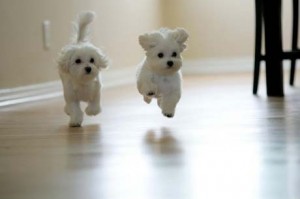 So you’ve just recently made an adorable addition to your family—a brand-new puppy. Puppies can be lovable and playful, but they’re also a little messy! Dog expert Cesar Millan, star of National Geographic Channel’s popular Dog Whisperer show, recognizes that housebreaking your puppy can be a challenging and sometimes frustrating task. Luckily, Millan shared a few secrets with WD that should help make potty-training your pup a cinch!
So you’ve just recently made an adorable addition to your family—a brand-new puppy. Puppies can be lovable and playful, but they’re also a little messy! Dog expert Cesar Millan, star of National Geographic Channel’s popular Dog Whisperer show, recognizes that housebreaking your puppy can be a challenging and sometimes frustrating task. Luckily, Millan shared a few secrets with WD that should help make potty-training your pup a cinch!
1. Be consistent. According to Millan, daily consistency is the key to a housebroken dog. If you feed and walk your puppy early one day, you should do so every day. (Yes, even on weekends and holidays.) By developing a routine for your dog to follow, you are teaching him or her to expect exercise and food at certain times of the day when you are prepared to provide them. You may like sleeping in on Sundays, but it’s just another day to Fido. If you’re still tired after a morning walk, you and your puppy can return to bed for an afternoon nap!
2. Follow indoor rules. Your puppy’s indoor habits play an important role when it comes to proper housebreaking. When you’re not with your puppy, put him or her in an enclosed area or crate. This will teach your puppy how to be alone. “It’s important to introduce short periods of alone time as puppies,” Millan says. “It prevents separation anxiety from becoming a problem as they get older.” Many puppy owners resort to using Wee-Wee Pads, and Millan says that’s OK. However, while they may be useful for housebreaking, he recommends owners refrain from training dogs with these absorbent pads alone. It’s just not natural. Instead, alternate between indoor and outdoor bathroom habits.
3. Schedule potty breaks. Puppies should go outside first thing in the morning, but there are also several other times throughout the day that Millan suggests they have a potty break: immediately following each meal, after waking up from a nap and after long play sessions. If you think you’ll forget, set an alarm. What about after bedtime? Studies show that puppies should be able to hold their bladders for every month of life plus one. In other words, if your puppy is three months old, he should be capable of “holding it” for four hours. Unfortunately, this means you may be in for a few restless nights until housetraining really kicks in. “With patience and persistence from you, this period should not last long,” Millan says.
4. Keep your cool. Keep in mind that puppies have accidents! If your puppy has a messy mistake, instead of scolding him or her, remain calm and assertive while teaching your puppy the “right way.” For example, if you catch your puppy in mid-act in your home, simply distract him with a light touch or sound, pick him up and take him outdoors immediately. If you’re frustrated or stressed, dogs can certainly sense the negative energy, which could possibly lead to instability and behavioral problems.
5. Clean up quickly. Millan suggests having the right cleaning tools readily available for any mishaps. “I always have Swiffer Wet Cloths in the house to thoroughly clean up those messes left behind by my pack,” Millan says. For soft surfaces, he suggests a natural stain and odor remover that will help break down smells and stains in soiled areas. “If your dog associates the scent of waste with an area in your home, he may become accustomed to using that area as a toilet in the future,” he says. Having the proper supplies on hand will make cleanup a breeze and prevent similar accidents in the future.
6. Stay focused. According to Millan, most dogs can be housebroken by the time they are 10 months old. But keep in mind: Every dog is different. The amount of time it takes will also depend on you, the owner, and your level of commitment and consistency. “An attentive owner who sets boundaries and limitations, and utilizes tools like crates, baby gates and pee pads, should be able to accomplish this in less than a couple of weeks,” Millan says. With some focus and determination, your puppy should be housebroken in no time.